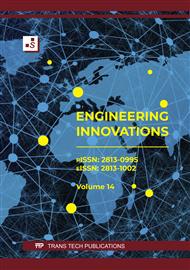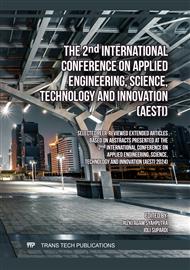[1]
E. Ilbahar, C. Kahraman, And S. Cebi, Risk Assessment Of Renewable Energy Investments: A Modified Failure Mode And Effect Analysis Based On Prospect Theory And Intuitionistic Fuzzy Ahp, Energy, Vol. 239, P. 121907, Jan. 2022.
DOI: 10.1016/J.Energy.2021.121907
Google Scholar
[2]
E. Heo, J. Kim, And K.-J. Boo, Analysis Of The Assessment Factors For Renewable Energy Dissemination Program Evaluation Using Fuzzy Ahp, Renew. Sustain. Energy Rev., Vol. 14, No. 8, Pp. 2214–2220, Oct. 2010.
DOI: 10.1016/J.Rser.2010.01.020
Google Scholar
[3]
A. Tasri And A. Susilawati, Selection Among Renewable Energy Alternatives Based On A Fuzzy Analytic Hierarchy Process In Indonesia, Sustain. Energy Technol. Assess., Vol. 7, Pp. 34–44, Sep. 2014.
DOI: 10.1016/J.Seta.2014.02.008
Google Scholar
[4]
D. Gielen, F. Boshell, D. Saygin, M. D. Bazilian, N. Wagner, And R. Gorini, The Role Of Renewable Energy In The Global Energy Transformation, Energy Strategy Rev., Vol. 24, Pp. 38–50, Apr. 2019.
DOI: 10.1016/J.Esr.2019.01.006
Google Scholar
[5]
J. W. Strandhagen, S.-V. Buer, M. Semini, E. Alfnes, And J. O. Strandhagen, Sustainability Challenges And How Industry 4.0 Technologies Can Address Them: A Case Study Of A Shipbuilding Supply Chain, Prod. Plan. Control, Vol. 33, No. 9–10, Pp. 995–1010, Jul. 2022.
DOI: 10.1080/09537287.2020.1837940
Google Scholar
[6]
T. B. Adams, "Feasibility Of Retrofitting Existing Hydropower Infrastructure For Use In Renewable Energy Storage, Thesis, Massachusetts Institute Of Technology, 2018. Accessed: Sep. 20, 2024. [Online]. Available: Https://Dspace.Mit.Edu/Handle/1721.1/119273
Google Scholar
[7]
N. S. D. Ladu, S. K. Subburaj, And R. Samikannu, A Review Of Renewable Energy Resources. Its Potentials, Benefits, And Challenges In South Sudan, In 2021 International Conference On Advancements In Electrical, Electronics, Communication, Computing And Automation (Icaeca), Oct. 2021, Pp. 1–6.
DOI: 10.1109/Icaeca52838.2021.9675574
Google Scholar
[8]
P. D. Santomil, D. R. Pazos, And S. F. Lopez, How To Promote The Development Of Renewable Energy Projects Through Crowdfunding? The Case Of Citizenergy Project, Dyna Manag., Vol. 7, No. 1, P. [12 P.]-[12 P.], Jan. 2019.
DOI: 10.6036/Mn9213
Google Scholar
[9]
P. D'orazio And P. Löwenstein, Mobilising Investments In Renewable Energy In Germany: Which Role For Public Investment Banks?, J. Sustain. Finance Invest., Vol. 12, No. 2, Pp. 451–474, Apr. 2022.
DOI: 10.1080/20430795.2020.1777062
Google Scholar
[10]
C.-C. Lee And S.-J. Ho, Impacts Of Export Diversification On Energy Intensity, Renewable Energy, And Waste Energy In 121 Countries: Do Environmental Regulations Matter?, Renew. Energy, Vol. 199, Pp. 1510–1522, Nov. 2022.
DOI: 10.1016/J.Renene.2022.09.079
Google Scholar
[11]
M. T. Kartal, S. Kılıç Depren, F. Ayhan, And Ö. Depren, Impact Of Renewable And Fossil Fuel Energy Consumption On Environmental Degradation: Evidence From Usa By Nonlinear Approaches, Int. J. Sustain. Dev. World Ecol., Vol. 29, No. 8, Pp. 738–755, Nov. 2022.
DOI: 10.1080/13504509.2022.2087115
Google Scholar
[12]
A. Rahman, O. Farrok, And M. M. Haque, Environmental Impact Of Renewable Energy Source Based Electrical Power Plants: Solar, Wind, Hydroelectric, Biomass, Geothermal, Tidal, Ocean, And Osmotic, Renew. Sustain. Energy Rev., Vol. 161, P. 112279, Jun. 2022.
DOI: 10.1016/J.Rser.2022.112279
Google Scholar
[13]
M. Segreto Et Al., Trends In Social Acceptance Of Renewable Energy Across Europe—A Literature Review, Int. J. Environ. Res. Public. Health, Vol. 17, No. 24, Art. No. 24, Jan. 2020.
DOI: 10.3390/Ijerph17249161
Google Scholar
[14]
T. Hacıimamoğlu And O. Sungur, How Do Economic Growth, Renewable Energy Consumption, And Political Stability Affect Environmental Sustainability In The United States? Insights From A Modified Ecological Footprint Model, J. Knowl. Econ., Apr. 2024.
DOI: 10.1007/S13132-024-01953-6
Google Scholar
[15]
M. Dumitraşcu Et Al., Renewable Energy, Climate Change And Environmental Challenges In Romania, In 2019 Ieee Pes Innovative Smart Grid Technologies Europe (Isgt-Europe), Sep. 2019, Pp. 1–5.
DOI: 10.1109/Isgteurope.2019.8905552
Google Scholar
[16]
F. Khalid, R. S. El-Emam, J. Hogerwaard, And I. Dincer, Techno-Economic Feasibility Of Renewable Energy Based Stand-Alone Energy System For A Green House: Case Study, Future Cities Environ., Vol. 4, Pp. 12–12, May 2018.
DOI: 10.5334/Fce.41
Google Scholar



